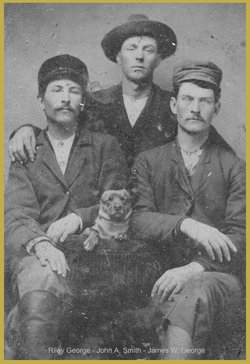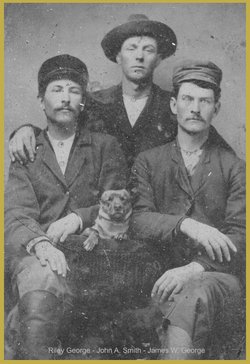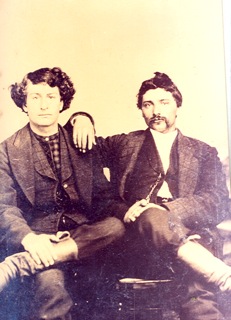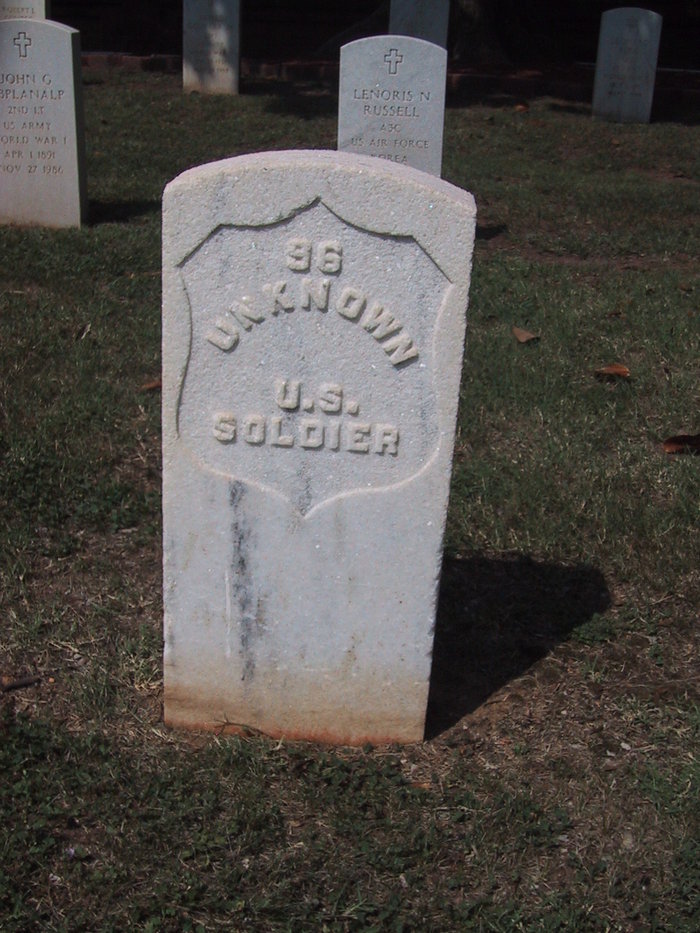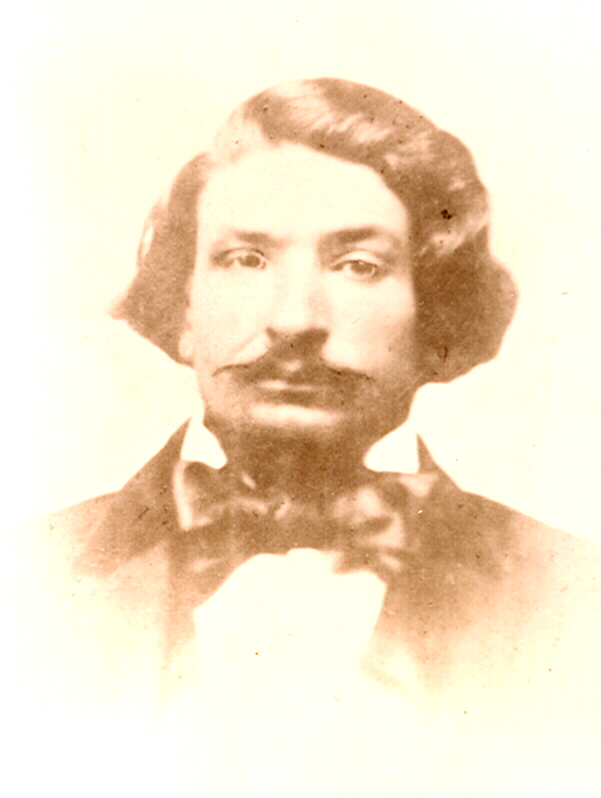Riley George was born on March 25, 1836 in Clinton County, Ohio, possibly on a farm near Lynchburg, Ohio, which was located on the border of Highland and Clinton County. Riley was the oldest of ten children known to have been born to William S. George and Susannah (Wilson) George. All six of William S. George's sons would serve in the Union Army, two dying in service.
William S. George was born on November 18, 1814 in either Highland County or Fayette County, Ohio. He was married to Susannah Wilson in December of 1834 in Highland County. Susannah was born on February 2, 1814 in Highland County. As stated before, ten children are known to have been born to William and Susannah. About 1841, William and Susannah made the decision to move west to Illinois, where they settled in Peoria County, near the town of Elmwood. This is the family as it appears in the 1850 census of Peoria County;
2222 2275 George William 35 M Farmer Ohio
2222 2275 George Susanna 35 F Ohio
2222 2275 George Riley 14 M Ohio
2222 2275 George Lydia J.12 F Ohio
2222 2275 George Rebecca 9 F Ohio
2222 2275 George Wilson 7 M Ill
2222 2275 George James 5 M Ill
2222 2275 George Thornton W. 3 M Ill
2222 2275 George Abel 1 M Ill
2222 2275 George Jacob 1 M Ill Jacob & Abel are both listed as being 1 year old.
The George family remained there in Peoria County about fourteen years farming the land. In 1855, most of the family moved westward again, this time to Marion County, Iowa, where they settled on a farm in Lake Prairie Township near Pella, Iowa. William and Susannah would remain there until William's death on February 22, 1899. Shortly after that, Susannah moved to Sully, Iowa, residing with one of her sons until her death on October 6, 1909. William and Susannah were both buried in the Graceland Cemetery in Pella, Iowa.
It is not known whether Riley made the move to Iowa with his parents or not. If he did move initially to Iowa with his parents, he did not remain long, as Riley is known to have soon been living with his Uncle, Ellis George, and his wife, Malita, near Farmington, Illinois in Fulton County, just west of Peoria County. Riley residing with his Aunt and Uncle for several years, but, Riley soon moved a little north where he was residing near the town of Maquon, Illinois in Knox County, just north and west of Peoria County. Riley George is found there in Elba Township in Knox County at the time of the 1860 census.
On August 5, 1862, Riley volunteered to serve in a company which was being raised in Maquon, Illinois by a local Carpenter, Contractor and Businessman by the name of James L. Burhalter.
ILLINOIS CIVIL WAR DETAIL REPORT
Name GEORGE, RILEY
Rank PVT Company F Unit 86 IL US INF
Personal Characteristics
Residence MAQUON, KNOX CO, IL Age 26 Height 5' 10 1/2 Hair DARK
Eyes DARK Complexion DARK Marital Status SINGLE Occupation FARMER
Nativity CLINTON CO, OH
Service Record
Joined When AUG 5, 1862 Joined Where MAQUON, IL
Joined By Whom J L BURKHALTER Period 3 YRS
Muster In AUG 27, 1862 Muster In Where PEORIA, IL
Muster In By Whom N/A Muster Out N/A
Muster Out Where N/A Muster Out By Whom N/A
Remarks N/A
When Burkhalter had about 100 volunteers, he led the Maquon company into Peoria, where they went into camp at Camp Lyon, near present day Glen Oak Park. There on August 27, 1862, he was elected by the men of the Maquon company to be their Captain and Captain Burkhalter and 93 of his volunteers were mustered in as Co. F of the 86th Regiment of Illinois Volunteer Infantry.
On September 7, 1862, the men of the 86th Illinois marched of the gates of Camp Lyon, Capt. James L. Burkhalter leading Co. F, through the streets of Peoria, with much fanfare, and boarded a train bound for Camp Joe Holt, Jeffersonville, Indiana. Three weeks later, the men of the 86th were in the field in Kentucky as part of Col. Daniel McCook's Brigade, in pursuit of Confederate troops. On Oct. 8, 1862, the men of McCook's Brigade were engaged with those troops in the Battle of Perryville, Kentucky, the 86th Illinois suffering their first casualties. There would be many more in the coming years. After the Union victory at Perryville, the Confederate Army withdrew from Kentucky and McCook's Brigade marched on to Nashville, Tennessee, where they went into winter camp.
During these next two and a half years, the men of the 86th served in Tennessee, Georgia, Alabama, South Carolina and North Carolina. During this time, Riley was witness to and a participant in numerous battles and skirmishes, some of the bloodiest fighting in the Western Theatre of the war, including the Battles of Chicakamauga, Georgia; Resaca, Georgia; Rome, Georgia, Kennesaw Mountain, Georgia; Peach Tree Creek, Georgia; Jonesboro, Georgia; to name a few and marched with Sherman to the Sea.
On March 16, 1865, the men of the 86th Illinois were engaged with Confederates near the town of Averasboro, North Carolina, which was located near the Black River. During the Battle of Averasboro, the 86th Illinois suffered 5 casualties. Two men were killed outright, one was mortally wounded and two other were severely wounded. Corporal Riley George was one of the two men killed. A letter written on March 27, 1865, while the 86th was in camp near Goldsboro, North Carolina, by John A. Smith, a cousin of Riley's, who was serving in the same company, to his Aunt and Uncle has somehow survived to this day. In this letter, John A. Smith wrote,
"Camp Goldsboro: March 27, 1865
Dear Uncle and Aunt,
I seat my self to let you no how I am getting along. I am well and harty and hope these few lines will find you all well.
Well Aunt, I have some bad news to write you. Riley was killed on the 16th of March. We was on the skirmish line. He was killed about two O'clock and we did not get him of the field till night. He only spoke one word, he said, 'Boys, carry me off.' He was hit in the lower part of the bowels. He was buried as well as could be expected.
Then we was in another fight (The Battle of Bentonville, North Carolina) an the regiment lost 25 men. The rebs pumped on two divisions of our corps, but we sent them that we did not kill or capture. Our brigade was buring dead rebels all the next day.
Oh Aunt it seems so lonesome without Riley with us, it seem'd like I have lost a brother, but brave soldiers must fall in battle and Riley was as good a soldier as there was in the regiment.
Well I have some things of Rileys, I will send in this letter. I have out all of Riley's letters in a big envelope and am going to send them home. I did not read them. I want you to write as soon as you get this and tell me where to direct to James. Oh I forgot to tell you James McKee was captured on the 21st.
Well I have to Close. I want you to write soon.
J. A. Smith"
As stated in John A. Smith's letter, Corporal Riley George's earthly remains were laid to rest on the Averasboro Battlefield, but by the time his body was re-interred for burial several years after the war in one of the National Cemeteries, most likely the Raleigh National Cemetery, the identity of his grave had probably already been lost. Today the earthly remains of Corporal Riley George, Co. F, 86th Illinois, probably lie buried in the Raleigh National Cemetery under a tombstone marked simply, UNKNOWN U. S. SOLDIER.
Riley George is not the Riley, George who died 03/19/1865, who is buried in Grave #1169 in Plot 15. This George Riley, though it could be seen as a possibility that they accidentally reversed the name was a Private in Co. B of the 79th Pennsylvania Infantry. They apparently only died three days apart, ended up in the same cemetery and have the same name, only reversed. Strange, but apparently true."
by Baxter B. Fite III and Jerry Sanner
(Baxter and Jerry would enjoy hearing from anyone, especially descendants of the George family, who might be able to tell us more about Riley or the Georges. Baxter and Jerry would also love to get copies of any other photographs of Corporal Riley George for his Find A Grave site and for the local historical societies. Baxter)
Riley George was born on March 25, 1836 in Clinton County, Ohio, possibly on a farm near Lynchburg, Ohio, which was located on the border of Highland and Clinton County. Riley was the oldest of ten children known to have been born to William S. George and Susannah (Wilson) George. All six of William S. George's sons would serve in the Union Army, two dying in service.
William S. George was born on November 18, 1814 in either Highland County or Fayette County, Ohio. He was married to Susannah Wilson in December of 1834 in Highland County. Susannah was born on February 2, 1814 in Highland County. As stated before, ten children are known to have been born to William and Susannah. About 1841, William and Susannah made the decision to move west to Illinois, where they settled in Peoria County, near the town of Elmwood. This is the family as it appears in the 1850 census of Peoria County;
2222 2275 George William 35 M Farmer Ohio
2222 2275 George Susanna 35 F Ohio
2222 2275 George Riley 14 M Ohio
2222 2275 George Lydia J.12 F Ohio
2222 2275 George Rebecca 9 F Ohio
2222 2275 George Wilson 7 M Ill
2222 2275 George James 5 M Ill
2222 2275 George Thornton W. 3 M Ill
2222 2275 George Abel 1 M Ill
2222 2275 George Jacob 1 M Ill Jacob & Abel are both listed as being 1 year old.
The George family remained there in Peoria County about fourteen years farming the land. In 1855, most of the family moved westward again, this time to Marion County, Iowa, where they settled on a farm in Lake Prairie Township near Pella, Iowa. William and Susannah would remain there until William's death on February 22, 1899. Shortly after that, Susannah moved to Sully, Iowa, residing with one of her sons until her death on October 6, 1909. William and Susannah were both buried in the Graceland Cemetery in Pella, Iowa.
It is not known whether Riley made the move to Iowa with his parents or not. If he did move initially to Iowa with his parents, he did not remain long, as Riley is known to have soon been living with his Uncle, Ellis George, and his wife, Malita, near Farmington, Illinois in Fulton County, just west of Peoria County. Riley residing with his Aunt and Uncle for several years, but, Riley soon moved a little north where he was residing near the town of Maquon, Illinois in Knox County, just north and west of Peoria County. Riley George is found there in Elba Township in Knox County at the time of the 1860 census.
On August 5, 1862, Riley volunteered to serve in a company which was being raised in Maquon, Illinois by a local Carpenter, Contractor and Businessman by the name of James L. Burhalter.
ILLINOIS CIVIL WAR DETAIL REPORT
Name GEORGE, RILEY
Rank PVT Company F Unit 86 IL US INF
Personal Characteristics
Residence MAQUON, KNOX CO, IL Age 26 Height 5' 10 1/2 Hair DARK
Eyes DARK Complexion DARK Marital Status SINGLE Occupation FARMER
Nativity CLINTON CO, OH
Service Record
Joined When AUG 5, 1862 Joined Where MAQUON, IL
Joined By Whom J L BURKHALTER Period 3 YRS
Muster In AUG 27, 1862 Muster In Where PEORIA, IL
Muster In By Whom N/A Muster Out N/A
Muster Out Where N/A Muster Out By Whom N/A
Remarks N/A
When Burkhalter had about 100 volunteers, he led the Maquon company into Peoria, where they went into camp at Camp Lyon, near present day Glen Oak Park. There on August 27, 1862, he was elected by the men of the Maquon company to be their Captain and Captain Burkhalter and 93 of his volunteers were mustered in as Co. F of the 86th Regiment of Illinois Volunteer Infantry.
On September 7, 1862, the men of the 86th Illinois marched of the gates of Camp Lyon, Capt. James L. Burkhalter leading Co. F, through the streets of Peoria, with much fanfare, and boarded a train bound for Camp Joe Holt, Jeffersonville, Indiana. Three weeks later, the men of the 86th were in the field in Kentucky as part of Col. Daniel McCook's Brigade, in pursuit of Confederate troops. On Oct. 8, 1862, the men of McCook's Brigade were engaged with those troops in the Battle of Perryville, Kentucky, the 86th Illinois suffering their first casualties. There would be many more in the coming years. After the Union victory at Perryville, the Confederate Army withdrew from Kentucky and McCook's Brigade marched on to Nashville, Tennessee, where they went into winter camp.
During these next two and a half years, the men of the 86th served in Tennessee, Georgia, Alabama, South Carolina and North Carolina. During this time, Riley was witness to and a participant in numerous battles and skirmishes, some of the bloodiest fighting in the Western Theatre of the war, including the Battles of Chicakamauga, Georgia; Resaca, Georgia; Rome, Georgia, Kennesaw Mountain, Georgia; Peach Tree Creek, Georgia; Jonesboro, Georgia; to name a few and marched with Sherman to the Sea.
On March 16, 1865, the men of the 86th Illinois were engaged with Confederates near the town of Averasboro, North Carolina, which was located near the Black River. During the Battle of Averasboro, the 86th Illinois suffered 5 casualties. Two men were killed outright, one was mortally wounded and two other were severely wounded. Corporal Riley George was one of the two men killed. A letter written on March 27, 1865, while the 86th was in camp near Goldsboro, North Carolina, by John A. Smith, a cousin of Riley's, who was serving in the same company, to his Aunt and Uncle has somehow survived to this day. In this letter, John A. Smith wrote,
"Camp Goldsboro: March 27, 1865
Dear Uncle and Aunt,
I seat my self to let you no how I am getting along. I am well and harty and hope these few lines will find you all well.
Well Aunt, I have some bad news to write you. Riley was killed on the 16th of March. We was on the skirmish line. He was killed about two O'clock and we did not get him of the field till night. He only spoke one word, he said, 'Boys, carry me off.' He was hit in the lower part of the bowels. He was buried as well as could be expected.
Then we was in another fight (The Battle of Bentonville, North Carolina) an the regiment lost 25 men. The rebs pumped on two divisions of our corps, but we sent them that we did not kill or capture. Our brigade was buring dead rebels all the next day.
Oh Aunt it seems so lonesome without Riley with us, it seem'd like I have lost a brother, but brave soldiers must fall in battle and Riley was as good a soldier as there was in the regiment.
Well I have some things of Rileys, I will send in this letter. I have out all of Riley's letters in a big envelope and am going to send them home. I did not read them. I want you to write as soon as you get this and tell me where to direct to James. Oh I forgot to tell you James McKee was captured on the 21st.
Well I have to Close. I want you to write soon.
J. A. Smith"
As stated in John A. Smith's letter, Corporal Riley George's earthly remains were laid to rest on the Averasboro Battlefield, but by the time his body was re-interred for burial several years after the war in one of the National Cemeteries, most likely the Raleigh National Cemetery, the identity of his grave had probably already been lost. Today the earthly remains of Corporal Riley George, Co. F, 86th Illinois, probably lie buried in the Raleigh National Cemetery under a tombstone marked simply, UNKNOWN U. S. SOLDIER.
Riley George is not the Riley, George who died 03/19/1865, who is buried in Grave #1169 in Plot 15. This George Riley, though it could be seen as a possibility that they accidentally reversed the name was a Private in Co. B of the 79th Pennsylvania Infantry. They apparently only died three days apart, ended up in the same cemetery and have the same name, only reversed. Strange, but apparently true."
by Baxter B. Fite III and Jerry Sanner
(Baxter and Jerry would enjoy hearing from anyone, especially descendants of the George family, who might be able to tell us more about Riley or the Georges. Baxter and Jerry would also love to get copies of any other photographs of Corporal Riley George for his Find A Grave site and for the local historical societies. Baxter)
Family Members
-
![]()
Lydia Jane George Walton
1838–1872
-
![]()
Rebecca Susannah George Baty
1840–1867
-
![]()
Wilson Bennami "Wiltz" George
1842–1927
-
![]()
James William "Jim" George
1843–1928
-
![]()
Fountain Watkins George
1847–1887
-
![]()
Pvt Jacob George
1849–1864
-
![]()
Abel Thornberry "Abe" George
1849–1934
-
![]()
Marion McDonald George
1852–1937
-
![]()
Mary Adeline "Addie" George Washburn
1856–1878
Advertisement
Records on Ancestry
Advertisement
